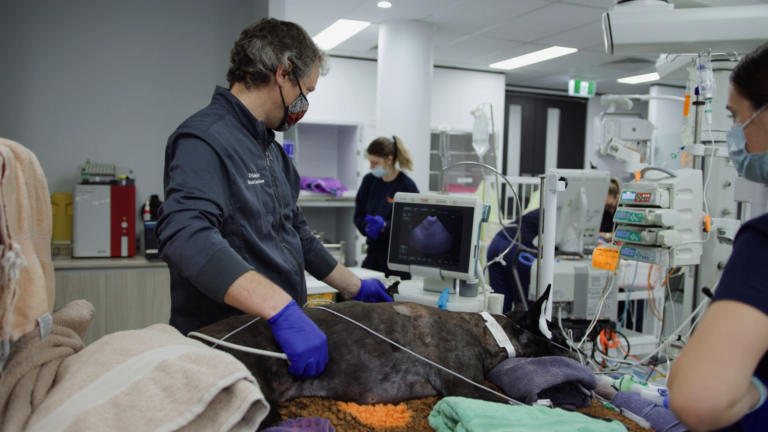Reviewed by Dr Hilary Chan, Specialist in Dermatology
Allergies in dogs are one of the most common reasons that owners visit the vet. Understanding the nature, causes, and treatment options for allergies in dogs is essential for ensuring their health and well-being. In this comprehensive guide, we delve into the intricacies of allergies in dogs, covering everything from their causes to potential treatments.
What are allergies in dogs?
Allergies are an over-reaction of the body’s immune system to what is usually a relatively harmless stimulant in the environment or diet. It is a complex syndrome that is caused by a combination of factors including:
- Genetics: some breeds are more prone to allergies than others, suggesting a genetic component to allergic reactions in dogs
- An over-sensitive (or hypersensitive) immune system
- Skin barrier dysfunction: the skin barrier does not function as effectively in allergic dogs as there are “gaps” between the skin cells, which allow environmental allergens to penetrate through and further perpetuate the allergies
- Allergen exposure
Allergic reactions in dogs can manifest in various ways, such as itching, redness, swelling, rash, ear infections, sneezing, weepy eyes, coughing or digestive issues. These symptoms can significantly impact a dog’s quality of life if left untreated.
What causes allergies in dogs?
Just like humans, dogs can be allergic to a wide range of substances, including plant pollens, dust mites, mould, certain foods, and even fleas or certain types of fabric.
Common allergens that trigger allergic reactions in dogs can include:
- Environmental allergens: Air-borne pollens (tree, grass, weeds), mould spores, dust mites can induce both seasonal and non-seasonal allergies.
- Fleas: Some dogs are allergic to flea saliva, and even a single flea bite can trigger a disproportionately intense itch and discomfort; fleas seen on the dog. This differs to a flea infestation where a larger number of fleas may be seen and the itch may be less intense.
- Food: Certain ingredients in dog food such as beef and dairy products, chicken and wheat can cause both skin and gut signs. It is important to note that none of these ingredients are inherently “unhealthy”. However, they can cause a reaction in predisposed and sensitised individuals.
- Contact allergens: Dogs can develop allergies to substances they directly come into contact with, such as certain grass sap, plants, fabrics, detergents, or grooming products.
Identifying the specific allergen triggering your dog’s symptoms is crucial for effective management and treatment.
Allergy Testing for Dogs
Diagnosing allergies in dogs typically involves a combination of medical history review, physical examination, and allergy testing. Allergy testing for dogs may include:
- Elimination diet trials: If food allergies are suspected, an elimination diet trial may be conducted to identify and eliminate potential food triggers from the dog’s diet systematically.
- Skin tests: Intradermal allergy testing (IDAT) involves injecting small amounts of allergens into the dog’s skin to observe for any reactions. This is generally considered as the most effective way to identify environmental allergens for the purpose of formulating a recipe for immunotherapy (see below).
- Blood tests: Blood tests, such as enzyme-linked immunosorbent assay (ELISA) or radioallergosorbent test (RAST), measure the levels of antibodies produced in response to specific allergens. They can give an indication of allergic reactions. However, there are limitations to blood tests for allergens, e.g. limited panel of allergens will show up on blood tests.
It is important to note that there is currently no reliable skin, blood or saliva test for food allergens, and elimination diet trial remain the gold standard for food allergy diagnosis.
Once the allergens are identified, a personalised treatment plan can be developed to alleviate your dog’s symptoms and improve their quality of life.
How to Treat Allergies in Dogs
Treating allergies in dogs often involves a multi-faceted approach aimed at reducing exposure to allergens and managing symptoms effectively. Treatment options for allergies in dogs may include:
- Reducing allergen exposure: Minimise your dog’s exposure to known allergens by keeping dogs indoors whilst mowing the lawn, using hypoallergenic bedding or washing bedding more frequently, and regularly cleaning their living environment. Depending on what the allergens are, this may not always be feasible or practical.
- Medications: Medications may be prescribed to relieve itching, inflammation, and other allergy symptoms. However, long-term use of some medications may have side effects, so they should be used under veterinary supervision.
- Dietary supplements, creams and shampoos: Some over the counter products may be effective in improving the skin barrier, which may help to reduce the severity of allergic reactions when used in conjunction with a veterinary plan
- Immunotherapy: “Allergy shots” or “allergy vaccines” or may be recommended by a veterinary dermatologist for some dogs with allergies. These treatments involve gradually exposing the dog to small amounts of the allergen to allow their immune system to build tolerance to the allergens over time.
Allergy Vaccines for Dogs
In recent years, advancements in veterinary medicine have led to the development of allergy vaccines for dogs, also known as allergen-specific immunotherapy (ASIT). These vaccines are formulated by veterinary dermatologists to target the specific allergens causing allergic reactions in individual dogs.
Allergy vaccines work by exposing the dog’s immune system to tiny amounts of the allergen, gradually desensitising them and reducing the severity of allergic reactions over time. Allergy vaccines are typically administered through subcutaneous injections and less commonly orally, under veterinary supervision.
While allergy vaccines can be highly effective in managing allergies in some dogs, they require a commitment to long-term treatment and may take several months to achieve noticeable results.
In conclusion, allergies in dogs can significantly impact their health and well-being, but with proper diagnosis and treatment, most dogs can lead happy, comfortable lives. By understanding the causes of allergies, undergoing appropriate testing, and exploring various treatment options, you can effectively manage your dog’s allergies and provide them with the relief they need to thrive. Consult with your veterinarian, or contact SASH, to develop a personalised allergy management plan tailored to your dog’s specific needs.




